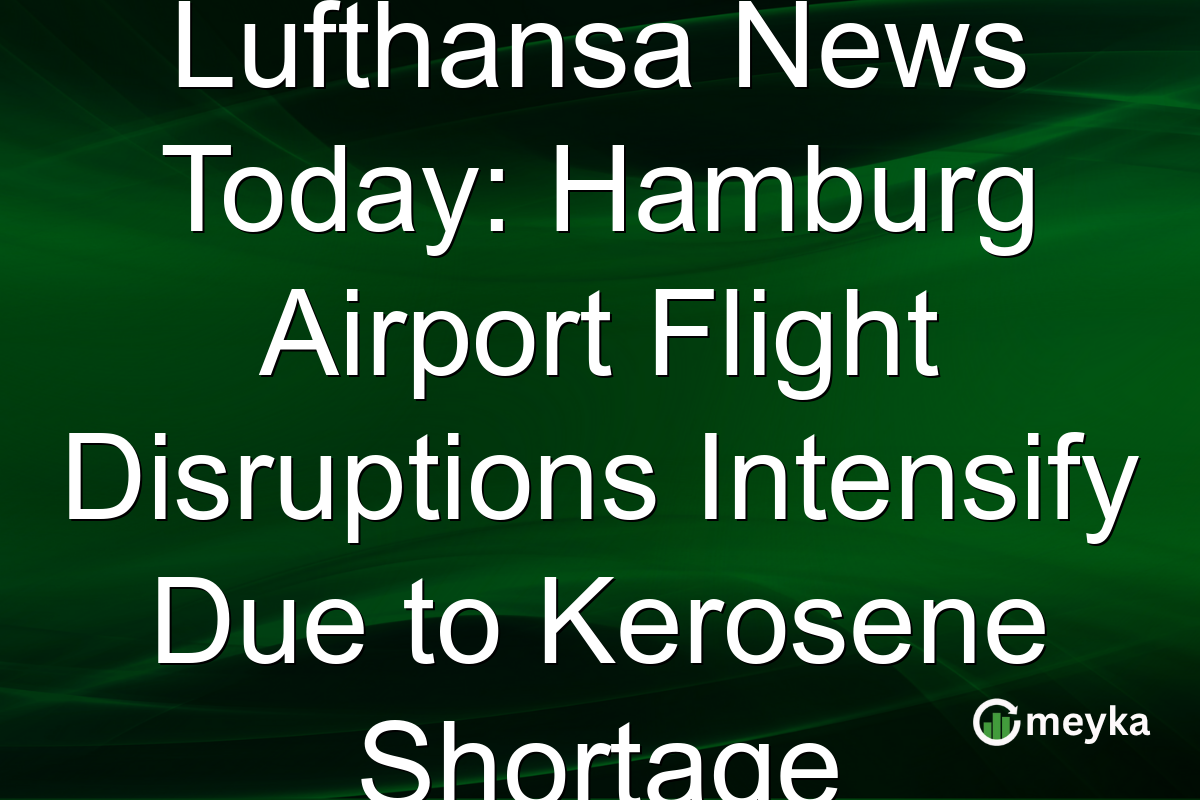Lufthansa News Today: Hamburg Airport Flight Disruptions Intensify Due to Kerosene Shortage
Hamburg Airport is facing a critical shortage of kerosene fuel, severely disrupting flight operations and causing widespread cancellations. This supply chain issue is primarily affecting Lufthansa, alongside other major carriers operating in Germany. As airlines grapple with this unexpected crisis, passengers are left frustrated, and aviation stocks, including Lufthansa’s, are under pressure. This development highlights vulnerabilities in airline logistics, with ripple effects impacting both travel plans and market sentiments.
Cause and Impact of the Kerosene Shortage
### What Happened at Hamburg Airport? Hamburg Airport is currently experiencing a disruptively low supply of kerosene, an essential aspect of aviation fuel. This shortage is attributed to logistical blockages that have hampered deliveries, affecting the airport’s ability to maintain normal operations. ### Immediate Consequences The shortage has led to significant flight cancellations and delays. Lufthansa, Germany’s flagship airline, is among the carriers most affected, with numerous flights grounded. This disruption is prominently affecting both domestic and international routes, causing inconvenience to travelers and financial stresses on the airlines. Hamburg Airport’s operational crisis illustrates a critical point: supply chain stability is as important as the aircraft themselves in ensuring the reliability of air travel. For more details, see the full article on [Reuters](https://www.reuters.com/business/aerospace-defense/hamburg-airport-kerosene-shortage-grounds-flights-2025-09-19).
Market Reactions and Stock Implications
### Impact on Lufthansa Stock Lufthansa’s stock, traded as LHA.DE, opened at €7.5 and is experiencing volatility due to the current crisis. The stock price is witnessing minor fluctuations, currently at €7.49, but the broader trend over recent months shows a declining pattern, evident in a -3.21% change year-to-date. ### Broader Stock Market Impact The kerosene shortage is a reminder of how sensitive airline stocks can be to operational disruptions. Aside from Lufthansa, this event has created ripples impacting other airline stocks and the industry’s overall market perception. With a market cap of approximately €8.99 billion, Lufthansa is in a robust position, but current events stress-test the resilience of even the most established carriers. Investors should monitor these developments closely, as disruptions could lead to more pronounced impacts if not swiftly addressed.
Strategic Responses and Long-term Analysis
### Airline Response Strategies In response to the kerosene shortage, airlines are scrambling to implement temporary measures to mitigate customer inconvenience. Some are rerouting flights to airports with stable fuel supplies, while others are relying on existing reserves where possible. ### Long-term Implications This crisis could expedite efforts to diversify fuel logistics and supply chains, minimizing similar risks in the future. The situation highlights the need for strategic contingency planning among airlines—a potential area where platforms like Meyka can provide critical insights and predictive analytics. For investors, diversification into sectors less vulnerable to such disruptions could be a prudent strategy, while keeping a watchful eye on potential recovery phases within the airline industry.
Travelers’ Experience and Airline Performance Recovery
### Passenger Experience Travelers are notably affected by significant flight reschedules, cancellations, and delays. The passenger experience has considerably diminished, adding pressure on airlines to improve customer service during crisis times. ### Recovery and Performance Outlook As the kerosene issue persists, immediate recovery seems challenging. Lufthansa’s earnings are due on October 30, 2025, and will be a crucial indicator of how financials are coping with these disruptions. CNBC offers more insights into aviation’s current and future state amid the crisis.
Final Thoughts
The kerosene shortage at Hamburg Airport starkly illustrates the fragility of airline operational logistics. With Lufthansa and other carriers in Germany facing substantial challenges, stock and aviation market stakeholders are observing closely. The crisis has precipitated a reevaluation of supply chain strategies, highlighting an urgent need for robust, flexible, and sustainable solutions. As the situation unfolds, real-time insights from platforms like Meyka will be invaluable to investors and industry players aiming to navigate this turbulence. For travelers, flexibility and patience remain key as airlines work towards restoring normalcy. Looking ahead, the resolution of this fuel crisis will set a precedent for handling logistical disruptions in airline operations.
FAQs
The shortage is due to logistical blockages preventing normal fuel deliveries, impacting operational capacity at the airport and affecting flight schedules.
Lufthansa is facing significant disruptions, with numerous flight cancellations affecting both domestic and international operations. This has also impacted their stock performance.
Passengers face delays and cancellations, leading to a diminished travel experience. Airlines are working to minimize disruptions by rerouting flights and utilizing reserves.
This situation could lead to increased investment in diversified fuel supply chains and emphasize the need for more resilient logistical strategies to prevent future disruptions.
Investors should stay informed with real-time updates from sources like Meyka, consider portfolio diversification, and monitor recovery signals within the airline sector.
Disclaimer:
This is for information only, not financial advice. Always do your research.






